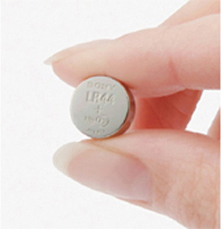Jun 12 2009
Sony Corporation (Tokyo, Japan) today announced the realization of a mercury-free alkaline button battery (LR), and plans to commercialize six models of those environmentally conscious batteries.

With conventional alkaline button batteries, mercury was added to the anode material in order to prevent the occurrence of Hydrogen gas. Furthermore, as the cathode material used in these batteries was known to have a low rate of Hydrogen gas absorption, making the creation of a totally mercury-free alkaline button battery a significant technological challenge. The mercury-free alkaline button battery announced today, incorporates proprietary Sony technology that mixes absorbent raw material into the cathode for the first time. By combining this with existing technology that prevents Hydrogen gas occurrence on the anode (which Sony originally adopted in its mercury-free silver oxide (SR) button batteries), Sony has succeeded in eliminating the use of mercury in this new batteries.
Sony's development of environmentally conscious batteries
Sony's sales of alkaline button batteries and sliver oxide button batteries total approximately 300 million per year. The development of a new mercury-free alkaline button battery, in addition to Sony's existing silver oxide button batteries, will result in a reduction of approximately 470kg and approximately 68 bottles (500ml per bottle) of mercury per year. In general, when mercury is not disposed properly, it can infiltrate the food chain, and mercury has therefore been identified as a material that has of the potential to cause serious damage to the human body and environment. Sony will continue its advancement of environmentally conscious technologies in order to minimize the impact to the environment.